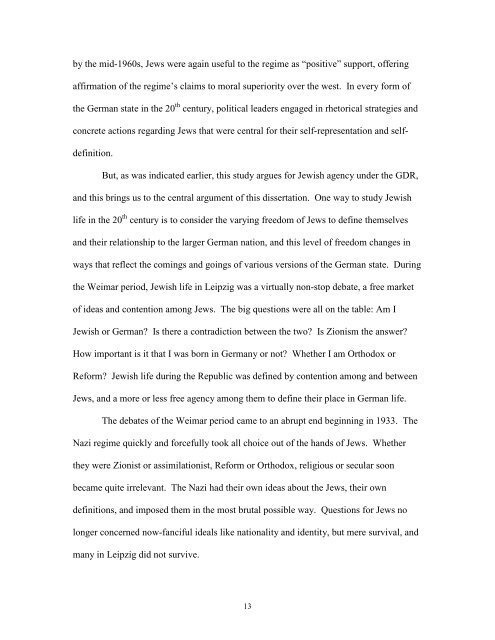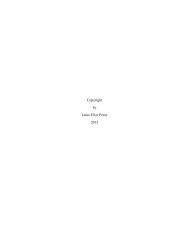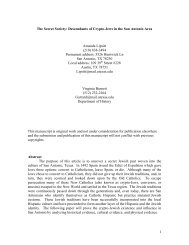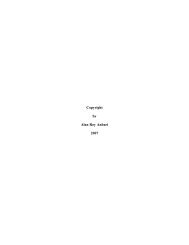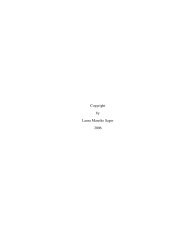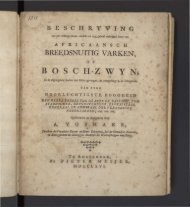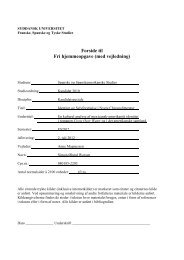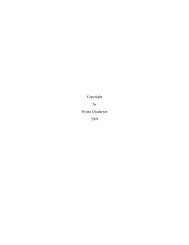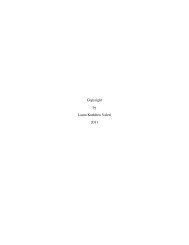Jews in Leipzig - The University of Texas at Austin
Jews in Leipzig - The University of Texas at Austin
Jews in Leipzig - The University of Texas at Austin
Create successful ePaper yourself
Turn your PDF publications into a flip-book with our unique Google optimized e-Paper software.
y the mid-1960s, <strong>Jews</strong> were aga<strong>in</strong> useful to the regime as “positive” support, <strong>of</strong>fer<strong>in</strong>g<br />
affirm<strong>at</strong>ion <strong>of</strong> the regime’s claims to moral superiority over the west. In every form <strong>of</strong><br />
the German st<strong>at</strong>e <strong>in</strong> the 20 th century, political leaders engaged <strong>in</strong> rhetorical str<strong>at</strong>egies and<br />
concrete actions regard<strong>in</strong>g <strong>Jews</strong> th<strong>at</strong> were central for their self-represent<strong>at</strong>ion and self-<br />
def<strong>in</strong>ition.<br />
But, as was <strong>in</strong>dic<strong>at</strong>ed earlier, this study argues for Jewish agency under the GDR,<br />
and this br<strong>in</strong>gs us to the central argument <strong>of</strong> this dissert<strong>at</strong>ion. One way to study Jewish<br />
life <strong>in</strong> the 20 th century is to consider the vary<strong>in</strong>g freedom <strong>of</strong> <strong>Jews</strong> to def<strong>in</strong>e themselves<br />
and their rel<strong>at</strong>ionship to the larger German n<strong>at</strong>ion, and this level <strong>of</strong> freedom changes <strong>in</strong><br />
ways th<strong>at</strong> reflect the com<strong>in</strong>gs and go<strong>in</strong>gs <strong>of</strong> various versions <strong>of</strong> the German st<strong>at</strong>e. Dur<strong>in</strong>g<br />
the Weimar period, Jewish life <strong>in</strong> <strong>Leipzig</strong> was a virtually non-stop deb<strong>at</strong>e, a free market<br />
<strong>of</strong> ideas and contention among <strong>Jews</strong>. <strong>The</strong> big questions were all on the table: Am I<br />
Jewish or German? Is there a contradiction between the two? Is Zionism the answer?<br />
How important is it th<strong>at</strong> I was born <strong>in</strong> Germany or not? Whether I am Orthodox or<br />
Reform? Jewish life dur<strong>in</strong>g the Republic was def<strong>in</strong>ed by contention among and between<br />
<strong>Jews</strong>, and a more or less free agency among them to def<strong>in</strong>e their place <strong>in</strong> German life.<br />
<strong>The</strong> deb<strong>at</strong>es <strong>of</strong> the Weimar period came to an abrupt end beg<strong>in</strong>n<strong>in</strong>g <strong>in</strong> 1933. <strong>The</strong><br />
Nazi regime quickly and forcefully took all choice out <strong>of</strong> the hands <strong>of</strong> <strong>Jews</strong>. Whether<br />
they were Zionist or assimil<strong>at</strong>ionist, Reform or Orthodox, religious or secular soon<br />
became quite irrelevant. <strong>The</strong> Nazi had their own ideas about the <strong>Jews</strong>, their own<br />
def<strong>in</strong>itions, and imposed them <strong>in</strong> the most brutal possible way. Questions for <strong>Jews</strong> no<br />
longer concerned now-fanciful ideals like n<strong>at</strong>ionality and identity, but mere survival, and<br />
many <strong>in</strong> <strong>Leipzig</strong> did not survive.<br />
13


